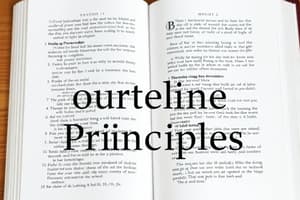Podcast
Questions and Answers
What is one primary reason John Stott believes writing is essential to clear thinking?
What is one primary reason John Stott believes writing is essential to clear thinking?
- It facilitates the organization of thoughts. (correct)
- It encourages memorization of sermons.
- It allows for spontaneous preaching.
- It restricts creativity in expressing ideas.
What consequence does Stott mention if one only prepares a minimal outline for a sermon?
What consequence does Stott mention if one only prepares a minimal outline for a sermon?
- The sermon becomes more engaging.
- The delivery of the message becomes repetitive. (correct)
- The sermon will be longer and more detailed.
- The preacher can adapt to audience feedback.
In what setting does John Stott suggest it is harder to express thoughts differently?
In what setting does John Stott suggest it is harder to express thoughts differently?
- When delivering a sermon on the spot. (correct)
- In casual conversations.
- In group discussions.
- During writing exercises.
What does Stott imply is a benefit of working through ideas during study?
What does Stott imply is a benefit of working through ideas during study?
According to Stott, how might a preacher feel when attempting to explain the gospel without sufficient preparation?
According to Stott, how might a preacher feel when attempting to explain the gospel without sufficient preparation?
What should be discarded ruthlessly when building a sermon?
What should be discarded ruthlessly when building a sermon?
What does the author suggest is necessary for writing sermons clearly?
What does the author suggest is necessary for writing sermons clearly?
Which statement best reflects the author's view on including personal ideas in a sermon?
Which statement best reflects the author's view on including personal ideas in a sermon?
According to the content, what is the primary question to ask during sermon preparation?
According to the content, what is the primary question to ask during sermon preparation?
Why does the author recommend assembling a sermon using a manuscript?
Why does the author recommend assembling a sermon using a manuscript?
What does the author imply about the temptation to include all ideas gathered during meditation?
What does the author imply about the temptation to include all ideas gathered during meditation?
What is the final stage mentioned in the process of sermon preparation?
What is the final stage mentioned in the process of sermon preparation?
What happens when presenters fail to think through the passage clearly?
What happens when presenters fail to think through the passage clearly?
Flashcards
Writing for Clear Thinking
Writing for Clear Thinking
The act of writing down your thoughts forces you to clarify and organize them, leading to clearer thinking.
Writing Enhances Communication
Writing Enhances Communication
When you write out your thoughts, you can experiment with different ways to express them, improving your communication skills.
Writing for Better Retention
Writing for Better Retention
Writing out your thoughts makes it physically easier to revisit and revise them, leading to better understanding and retention of information.
Avoiding Repetitive Preaching
Avoiding Repetitive Preaching
Signup and view all the flashcards
Preaching Prep for Creativity
Preaching Prep for Creativity
Signup and view all the flashcards
Building the Body of the Sermon
Building the Body of the Sermon
Signup and view all the flashcards
Is This Information Relevant?
Is This Information Relevant?
Signup and view all the flashcards
Ruthless Discarding
Ruthless Discarding
Signup and view all the flashcards
Writing the Message
Writing the Message
Signup and view all the flashcards
Manuscript Sermons
Manuscript Sermons
Signup and view all the flashcards
Writing Makes an Exact Man
Writing Makes an Exact Man
Signup and view all the flashcards
Half-Baked Ideas
Half-Baked Ideas
Signup and view all the flashcards
Thinking Through The Passage
Thinking Through The Passage
Signup and view all the flashcards
Study Notes
Sermon Preparation Stages
- Selecting Relevant Information: Carefully choose information for your sermon that directly supports your theme and conveys the intended message. Discard irrelevant details, even if initially noted. The key question is: does this truly enhance understanding of the passage? Avoid including anything that simply satisfies personal curiosity.
Ruthless Discarding of Irrelevant Details
-
Importance of Ruthlessness: Being "ruthless" in discarding irrelevant information is crucial. This principle is highlighted by John Stott.
-
Difficulty in Implementing: Eliminating non-essential ideas is easier said than done. Many potentially valuable, yet ultimately irrelevant thoughts may arise during meditation and note-taking.
-
Temptation to Include Everything: Resist the urge to include all ideas just because they occurred during study. Initial importance doesn't necessarily translate to importance when understanding the text.
Refining the Sermon Outline
- Writing as a Refinement Tool: The final stage involves refining the initial outline. Elaborate upon points, adding more thorough explanations and complete sentences.
Manuscript Writing for Sermons
-
Value of Writing: Advocating for writing sermons in near-manuscript form even if only delivering an outline. This practice, according to the speaker, enhances clarity and precision and emulates great preachers.
-
Avoiding Half-Baked Ideas: Writing out a sermon allows for the development of well-thought-out ideas, which in turn translates to a clearer and more effective sermon.
-
Discipline of Clear Thinking: The act of writing, as emphasized by John Stott, promotes the crucial discipline of clear thinking.
-
Maintaining Sermon Flexibility: Writing out the sermon enables the speaker to avoid repetitive delivery and explore fresh avenues for explaining the gospel.
-
Improved Sermon Delivery: Writing facilitates the ability to communicate ideas differently, avoiding habitual phrasing and allowing for creative adaptation during the actual sermon.
Studying That Suits You
Use AI to generate personalized quizzes and flashcards to suit your learning preferences.



